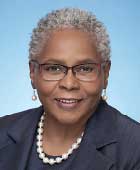Your APA: The First 100 Days

As I approach the end of the first 100 days of my presidency, I want to share some of the activities in which I have been involved on behalf of APA. My year started at the end of the Annual Meeting with representing APA at the National Children’s Mental Health Awareness Day event alongside first ladies from a half dozen states that support creating a more trauma-informed children’s mental health system (see here).
At the end of May, I joined other mental health and substance use professionals on Capitol Hill for a congressional briefing on mental health and criminal justice (see here). In June I was invited to share APA’s vision for psychiatry’s future hopes and challenges at the Psychiatry in 2018 Conference sponsored by McLean Hospital and Harvard Medical School.
Along with members of the APA administration, I then traveled to Japan and the United Kingdom, where I spoke about women in leadership positions in psychiatric associations and strategies being used around the world to support children in need of mental health care and their families.
In July, we had the first full Board of Trustees meeting of my presidency and addressed a wide range of issues. Among the highlights:
Update on APA’s survey of the economic impact of The Joint Commission’s ligature risk and self-assessment standards on psychiatric facilities and workforce.
Update on APA’s statements on psychological harm done to the approximate 3,000 undocumented children separated from their families because of the Department of Justice’s “zero-tolerance” policy. APA was one of the first medical associations to publicly oppose the policy of separating children from their parents and led 17 other mental health organizations in sending a letter to the Department of Justice, Department of Homeland Security, and Department of Health and Human Services urging the Trump administration to end its policy of separating children from their parents.
Update on APA’s continued advocacy for passage of the Overdose Prevention and Patient Safety (OPPS) Act, which aligns 42 CFR Part 2 with HIPAA requirements. The legislation would allow physicians to view a patient’s substance use record to facilitate quality care, supporting care coordination, the integration of treatment, and improved patient outcomes. It would also decrease stigma by allowing mental health and substance use disorders to be treated like any other illnesses.
Two other important issues consistent with my commitment to early career members were addressed: (1) the Board revised and approved an Assembly action paper on medical school repayment subsidies for psychiatrists practicing in community mental health centers, state psychiatric facilities, and correctional facilities and
(2) the Board approved an amendment to APA’s Operations Manual that prohibits members from serving on APA components while a member of the Board of Trustees (except appointments to those components that are specifically required to include members of the Board of Trustees).
I can’t take credit for either of these actions: they were already in motion when I became president. But I am proud that in my first 100 days as president, actions occurred that address issues I consider extremely important to securing a strong future for our profession—assisting early career psychiatrists with their significant debt load and assuring there is a place at the organizational table for them to share their interests, energy, and innovative ideas while some of those more seasoned members are available to mentor them.
Finally, in July we achieved the highest fundraising total ever in support of our APA Foundation at an APA Board of Trustees meeting—$6,000! To be able to say that APA’s top leadership has invested in the Foundation is important as its staff reaches out to organizations and individuals to seek support for our work to create a mentally healthy nation and share the success stories from our many signature programs. By the way, I hope you will all consider making an annual contribution so that we can continue APA’s excellent work to educate, inform, and empower the public and the profession and overcome the stigma, bias, and lack of accessible information associated with mental health issues. (Please visit https://apafdn.org/support for more information.)
As I recalled the above activities, I was reminded of a former president who said her term as president was like “drinking from a firehose.” I can honestly say I now know what she meant, and the solution seems to be to stay focused on the mission and make sure every action relates to that. And as always, I encourage you to send your suggestions on how we can continue to support increased involvement of members in the important work of our Association. ■



